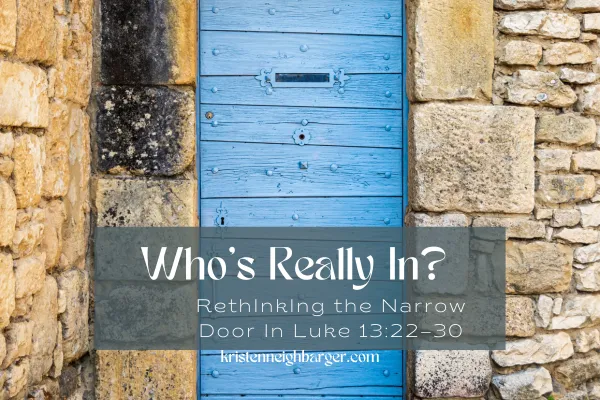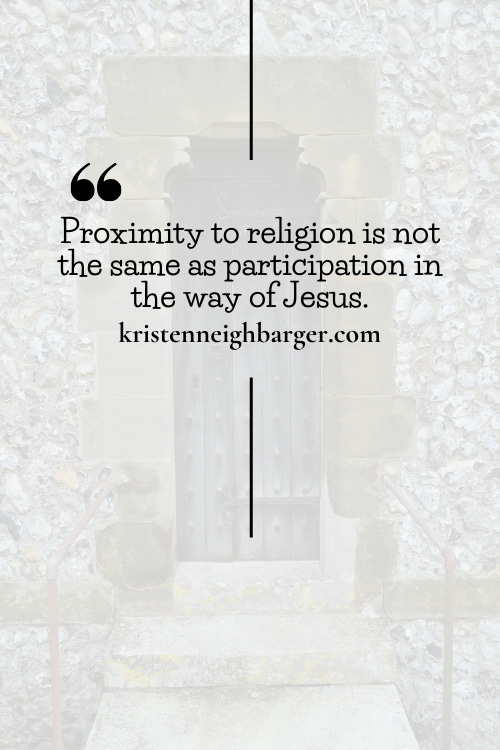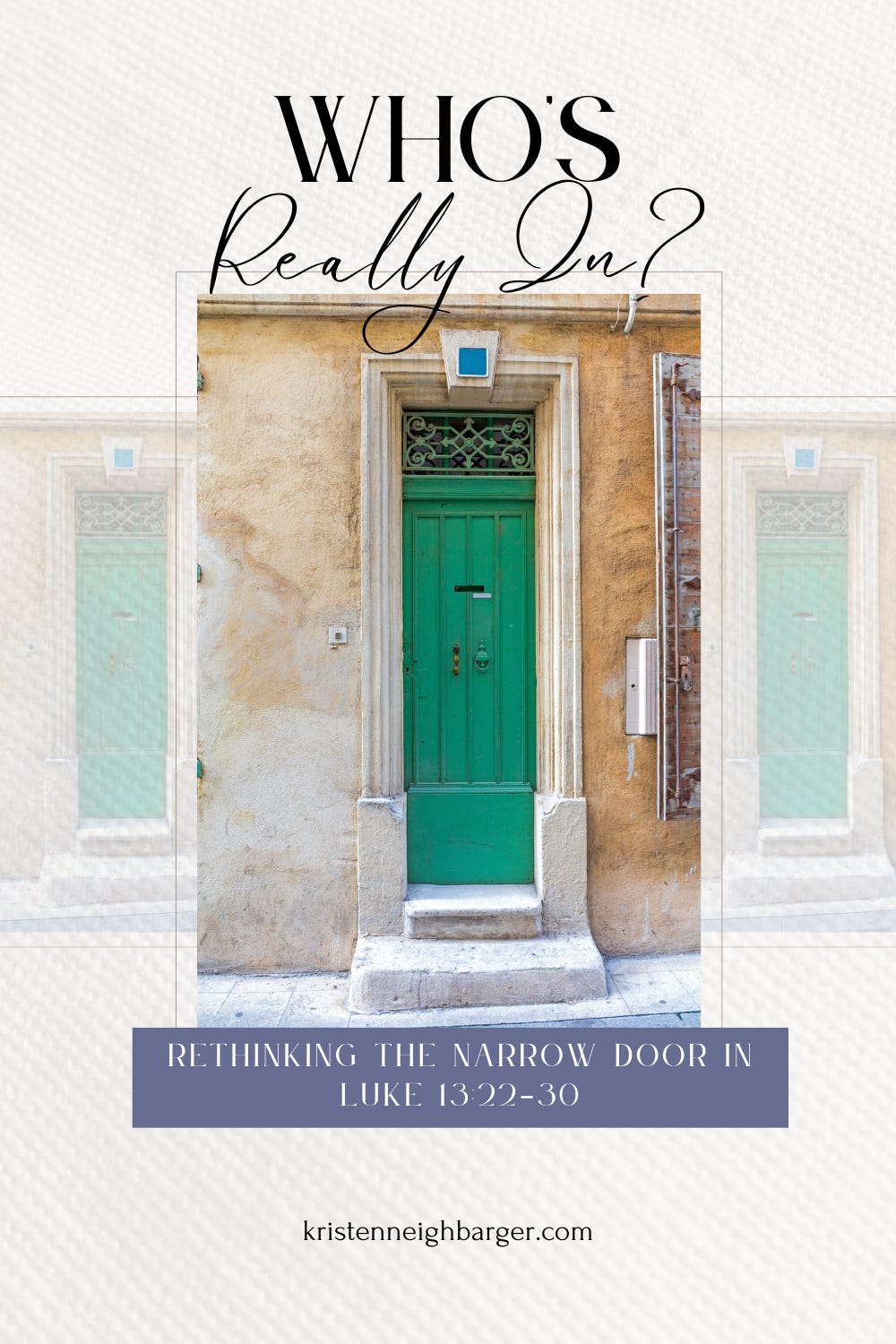
Who’s Really In? Rethinking the Narrow Door in Luke 13:22–30
I sat a few rows back from the casket as the pastor approached the podium, handkerchief in hand—a strange gesture from someone who barely knew my grandad.
After the typical opening lines about loss, this man—my grandma’s pastor—launched into a full-blown hellfire and brimstone sermon. It had nothing to do with my grandad’s life and everything to do with the pastor’s theology.
For the first few minutes, I was too dumbstruck to fully comprehend what was happening. But as he twisted Scripture and disrespected my grandad’s memory, my shock turned into seething anger.
“I’m giving him five more minutes of this heresy, and then I’m standing up,” I kept repeating in my head.
I wasn’t alone. My dad, sitting in the front row, fidgeted furiously. My brother’s leg bounced as he chewed his cuticles—a telltale sign he was just as livid.
Eventually, the pastor wrapped up and attempted to dismiss the crowd.
But my dad stood up, took the mic, and delivered the eulogy my grandad deserved—one filled with stories of kindness, sacrifice, quiet faith, and a legacy of love and generosity that spoke louder than any sermon.
This pastor didn’t know my grandad. He knew my grandma—who attended his tiny Pentecostal church and had supported him financially for years. Because my grandad didn’t attend, didn’t speak in tongues, and didn’t tithe, this man believed he was surely not in heaven—and felt compelled to make that painfully clear at his funeral.
That day has never sat right with me.
His belief that the “narrow door” meant entrance into his church, his theology, and maybe his version of Jesus exemplifies a problem I see too often: a fixation on proximity to religion rather than participation in the way of Jesus.

Luke 13:22–30 (TPT)
“Lord, will only a few have eternal life?”
Jesus said, “There is a great cost for anyone to enter through the narrow doorway into God’s kingdom. I tell you, many will want to enter but won’t be able to... You will see people streaming from the four corners of the earth, accepting the invitation to feast in God’s kingdom realm, while you are outside looking in. And take note of this: Some are despised and viewed as the least important now, but one day the master will place them at the head of the line. And some whom you view as ‘elite’ today will become the least important then.”
Reclaiming the Narrow Door
I’ll be honest—I almost skipped this passage and jumped straight to Luke 14. Of all Jesus’ parables, this one has been the most misused and personally triggering. I’ve heard it weaponized for decades to justify fear-based theology.
But how could I serve the faith reconstruction community if I only tackled the easy parts?
So, I dug in. I wrestled. I read deeply, especially from theologians like Brian Zahnd, whose grace-centered, Christlike interpretation gave me the courage to unpack this.
Here’s what I discovered.
The Villager Asked a Numbers Question… And Jesus Changed the Subject
In Luke 13, Jesus is traveling toward Jerusalem, stopping in villages to teach. A bystander asks: “Will only a few be saved?”
The question is about numbers—who’s in and who’s out.
But Jesus redirects it completely. He doesn’t answer how many. He turns the focus to how we live.
This shifted everything for me.
For most of my church life, I’ve heard this parable used to:
Scare people into salvation
Reinforce “us vs. them” mentalities
Judge those who don’t believe or behave a certain way
But this passage is about transformation, not tallying souls.
Proximity Isn’t Participation
Jesus says the narrow door is costly—and many will try to enter but be turned away.
The parable continues with people pleading at the door, saying, “We ate and drank with you!” But the master responds, “I don’t know you.”
These are not strangers. They’re insiders. They shared meals with Jesus. They had access. Yet their hearts and actions didn’t reflect his way.
Jesus doesn’t stop there. He flips the script—as he so often does.
He declares that the marginalized, the overlooked, and the despised will be the ones feasting in the kingdom, while the self-proclaimed elite are left outside.
This Is a Call to Transformation, Not Exclusion
When we strip away the fear-based interpretations and listen closely to what Jesus is saying, this parable becomes a radical call—not to doctrinal precision or insider status, but to transformation.
Jesus is clear: entering the narrow door will cost something.
Not because the door is small and only a few can squeeze through, but because we’re often carrying too much to fit—our pride, our certainty, our obsession with being right, our loyalty to systems that benefit us but exclude others.
The people outside the door weren’t strangers. They knew Jesus. They dined with him. They followed him around. They had proximity.
But they didn’t participate.
They didn’t live in a way that reflected his heart for the poor, the marginalized, the broken. They knew about Jesus, but their lives didn’t mirror his way.
Jesus isn’t calling for more belief.
He’s calling for alignment—a life marked by humility, justice, mercy, and self-giving love.
And then, in classic Jesus fashion, he flips the script completely:
“People will come from the east and west and north and south, and will take their places at the feast in the kingdom of God.”
He’s saying: You think you know who’s in? Think again.
Those you’ve ignored, dismissed, or even despised—those are the ones finding a seat at the table.
Not because they said the right prayer or attended the right church, but because they lived lives that echoed his kingdom values.
This isn’t a parable about who’s excluded.
It’s about how easily we exclude ourselves when we cling to proximity instead of transformation.
The door is narrow because transformation is hard—but it’s open.
And the feast is wider than we ever imagined.

So What Does It Look Like to Enter the Narrow Door Today?
It might look like:
Choosing to love the overlooked instead of chasing influence.
Dismantling exclusionary systems—even if they’re socially or spiritually accepted.
Walking away from churches that protect power but exclude the least of these.
Reflection Questions
Have I mistaken proximity to Christian culture for participation in the way of Jesus?
Where am I being invited to enter the narrow door—not of rigidity, but of surrender?
Am I clinging to status, certainty, or credentials instead of humility, justice, and compassion?
A Final Word
Friend, my prayer is that you would wrestle with this parable—even if it means wrestling with your theology or even with God. That tension might just lead you to a deeper understanding of grace, a clearer vision of the kingdom, and a reimagined faith built not on fear, but on love and transformation.
